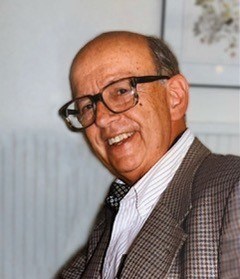
OBITUARIO
W Paul Strassmann
26 julio, 1926 – 9 enero, 2021

July 26, 1926 – January 9, 2021
W Paul Strassmann died at home in East Lansing, Michigan on January 9, 2021 of complications from Parkinson’s. Paul was born in Berlin, Germany on July 26, 1926 to Erwin Otto Strassmann and Ilse Helene Wens in the Frauenklinik hospital founded by Paul’s grandfather. After the Nazis rose to power, Paul’s Jewish-descended father and grandfather lost their faculty positions at the University of Berlin and in 1936 were forced to sell the Frauenklinik, leaving the family without income and at risk of further persecution. The Mayo Clinic enabled the family’s escape from Germany by providing affidavits for immigration visas and a fellowship for Paul’s father, who emigrated to Rochester, Minnesota in June 1936, followed by the rest of the family in August 1937.
In May 1938, the family moved to Houston, Texas, where non-citizens could still obtain medical licenses, allowing Paul’s father to practice medicine again. After Pearl Harbor, the US classified Paul and his family as enemy aliens, and prohibited them from travelling beyond Harris County and Galveston. Paul’s small Voigtlander camera and World War I binoculars were confiscated along with the family’s short-wave radio.
Paul graduated from San Jacinto Senior High School in 1943, and enrolled at Rice University before leaving to join the Navy in 1944. After the war, he switched his studies to economics and enrolled at the University of Texas at Austin, where he was elected Vice President of the student body after campaigning for “a pencil sharpener in every classroom.” He graduated in 1949 with a BA in economics, followed by an MA in economics from Columbia University in 1950. Fluent in Spanish, he accepted a position with the US Department of Commerce in the Latin American Republics Division.
While living in Washington D.C., he met the love of his life, Elizabeth Marsh Fanck, known as Betty. They married in London in 1952 and began a five-month honeymoon touring post-war Europe. Back home, they settled in Arlington, Virginia, to raise two daughters, Joan and Diana. Supported by Betty, who continued her work as an intelligence analyst with the National Security Agency, Paul returned to graduate school to complete his Ph.D. at the University of Maryland. Using hand-collected data, he explored risk and innovation in four American industries, concluding that flexibility and freedom from traditions facilitated American innovations in the nineteenth-century.
After obtaining his Ph.D., Paul accepted a position as a professor of economics at Michigan State University in East Lansing, Michigan. A third daughter, Beverly, was born in Lansing. For thirty-nine years from 1956 to 1995 Paul taught economics at Michigan State, specializing in the industrialization and urbanization of developing economies, and conducting in-depth field studies in sixteen countries in Latin America, Africa, the Middle East, and Asia. Informed by the cultures, history, and politics of the countries he studied, he aimed to illuminate neglected and misunderstood economic behavior. He was an early investigator of how best to provide housing and infrastructure to the urban poor and showed that housing policy must address the total housing stock, and not just new construction. Paul explored the dilemma that public housing was typically priced too high to be affordable for many. He investigated how specific infrastructure support, including electricity, water, and sewer systems, could enable people to improve their own housing. In all, Paul published nine books and over a hundred other publications. He guided sixteen dissertations, many centered in developing countries, and maintained lifelong friendships with numerous former students
In the 1990’s, after his retirement, Paul explored sixteen inherited cartons of letters, memoirs, diaries, albums, and clippings going back to the late 1700s, many written in an antiquated German script. From these he distilled a family story of migration and assimilation, focusing on his father’s Jewish progenitors who moved from Poland to Berlin, and the differing fates of family members who stayed in Europe from those who were able to emigrate. His book, The Strassmanns: Science, Politics, and Migration in Turbulent Times (1793 – 1993) was first translated and published in German in 2006, by Campus Verlag, and then in English in 2008, by Berghahn Press.
Paul was known for being funny and irreverent, articulate and intellectual, and he was deeply versed in history. He was a disciplined and devoted writer, genuinely interested in other people, and gifted in capturing the character and emotion of people in cartoons. Paul was a loving husband, and delighted his daughters with mischievous holiday tricks, outings to pick strawberries, skiing on East Lansing’s tiny hill, and swimming at Lake Michigan’s beaches. The lives of his daughters were immeasurably enriched by years in Mexico, Puerto Rico, London, and Geneva. Paul paid much attention to his daughters, grandchildren, and nieces and nephews, who fondly remember how special he made them feel.
Paul is survived by his sisters Renata Lauden and Angelica Trahan, his daughters Joan Elizabeth Strassmann (David Queller), Diana Louise Strassmann (Jeffery Smisek), and Beverly Ilse Strassmann (Claudius Vincenz), and grandchildren Anna Strassmann Mueller (Julio Postigo), Daniel Strassmann Mueller (Bruna Mayer de Souza), Philip Strassmann Queller (Rebecca Pacewicz), Julian Strassmann Smisek (Emily Margulies), and Patrick Smisek Strassmann and many treasured nieces, nephews and other relatives. Paul was preceded in death by his wife Elizabeth Fanck Strassmann, his parents Erwin Otto and Ilse Helene Strassmann, his grandson Jonathan Strassmann Smisek, and his devoted dachshunds, Seppl and Tosca. In his final years, Paul was expertly supported at home by longtime family friends, Tonia Nelson and Kayann Sterrett, along with a team of other devoted caregivers. Paul’s Life Celebration will be held in safer times. For details, please email <[email protected]> or contact any of his daughters.
Memorials may be given to the W. Paul Strassmann Fellowship at Michigan State University (https://givingto.msu.edu/gift/?sid=11561) or to the charity of your choice.
Muestre su apoyo
Comparta Un Recuerdo
Comparta
Un Obituario
Obtenga actualizaciones
DONACIONES
Servicios
COMPARTA UN OBITUARIO
- RECIBIR RECORDATORIOS
v.1.9.5